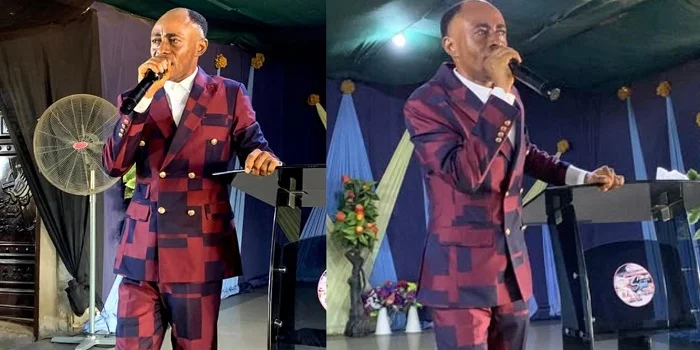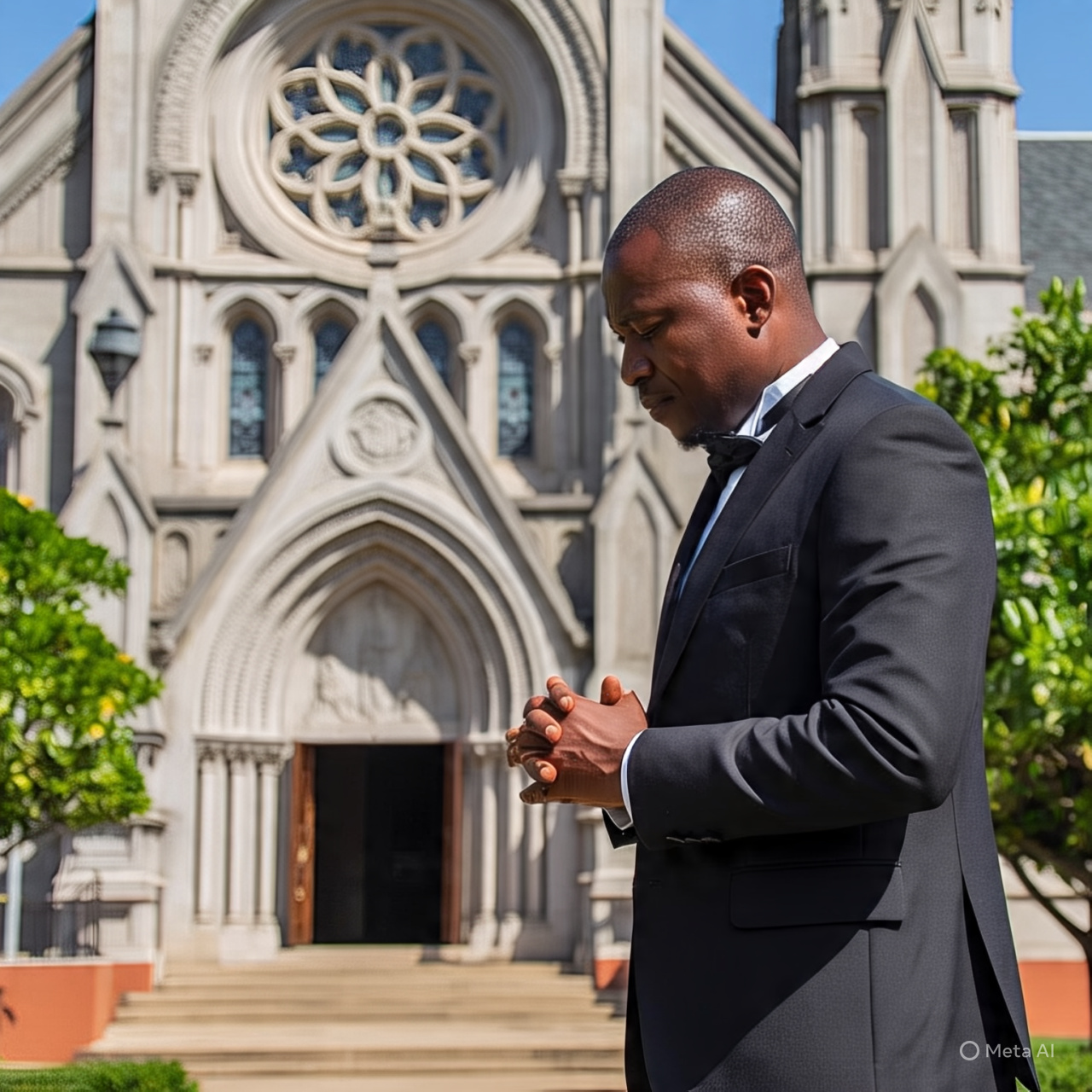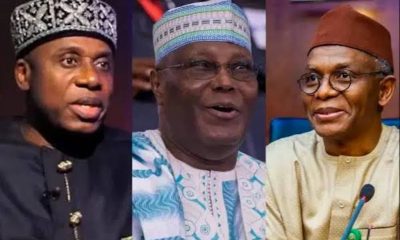Worship
Pastor Jerry Eze’s earned over N7 billion on YouTube streams

Eze, who started Streams of Joy International and leads the New Season Prophetic Prayers and Declaration, has earned over N7 billion on YouTube.
He is the highest-earning YouTube creator in Nigeria, mainly from his live prayer sessions.
His daily income from YouTube exceeds N7 million, contributing to his total earnings of N7 billion. On July 16, 2023, he made over N21 million in just one day due to increased traffic.
Eze has 2.1 million subscribers and is a well-known figure among Nigerians interested in digital prayer.
He makes millions daily from views, chats, and comments on his videos.
Recently, he received close to 30 million views in a week, averaging 418,000 views per day, with a total of 274 million views.
Eze has hosted about 1,677 live streams, which keep his audience engaged, including some overnight events.
He graduated in International Relations from Abia State University and is popular among Nigerian Christians who closely follow his prayer channel.

Worship
EXPOSED: Detained Abuja Pastor Amos Isah raped 14-year-old in church, threatened to kill her if she exposed him – Family

The detained founder and lead pastor of Prophetic Victory Voice of Fire Ministry in Gwagwalada, Abuja, Amos Isah, allegedly threatened to kill the 14-year-old girl he is accused of raping in the church auditorium, along with her family, if she spoke out.
Isah was arrested and detained by the Federal Criminal Investigation Department (FCID) over allegations of raping the minor…CONTINUE READING
The arrest, which took place last week, has sent shockwaves through the community, as Pastor Isah was known for his charismatic sermons and claims of divine power.
His church, located behind Noble Noel Academy, opposite Gwagwalada Market in Abuja, has been a centre of worship for many residents. A review of his Facebook page shows that Isah frequently posted messages about holiness and moral uprightness, contrasting sharply with the allegations against him.
However, a member of the girl’s family told SaharaReporters on Wednesday that Isah has a history of preying on underage girls, often taking them to secluded areas in his tinted-window car.
The source asserted that the abuse escalated when Isah invited the girl to the new church auditorium office, which had been prepared by female church members but was not yet in full use.
The source explained that once inside, he locked multiple doors to prevent escape, allegedly rubbed her head, asked her to kneel and then prayed for her before the assault.
The family source added that after the Isah saw blood, he gave the victim N3,000 for “medication,” prayed for her again, and then threatened to kill her and her family if she ever exposed him.
The source said: “Pastor Amos Isah has been preying on minors. There are others involved, and the police already have investigations underway, so this is not a hidden matter.
“The girl in question is an only child, aged 14 (nearly 15 at the time of the incident). From the start, he followed his usual pattern: luring girls, taking them to bushes in his tinted-window car, where he would assault them.
“He will have even slept with the girl when she was 13, because there was a time he took her in the car, and then he took her to a lonely bush. He first contacted the girl through her mother’s phone. He told her to meet him at the church.
“When she arrived, he manipulated the situation, making it seem like her mother had sent her. Later, he instructed his assistant, Segun, to direct the girl to meet him at Mobil. His intention was clear: to assault her.
“He drove her past his church member’s shop and told the girl to lay low to avoid being seen by church members, then drove to a remote area near Sharia Court in Gwagwalada, parked, and moved to the back seat. When he tried to remove her clothes, she protested, saying she was too young. He backed off but questioned her about her relationships, warning her not to tell anyone.
“The abuse escalated when he called her to his office—a secluded space in the new auditorium, which women had prepared but he had not moved into. He invited her on a Wednesday, but she said she couldn’t make it because she was at her mother’s shop. He invited her again on a Monday to the new auditorium, locked multiple doors, ensuring no escape. When the girl protested, he rubbed her head and asked her to kneel down and prayed, after which he forced himself on her despite her resistance.
“Afterward, he threatened her, gave her ₦3,000 for ‘medication’ after seeing blood on her. He asked her to kneel down again, prayed for her, and told her to go but warned her not to speak out, implying he had police connections who could harm her or her family.
“The girl later confided in her mother, who took her to a counsellor. Fearful, the girl begged her mother not to tell her father. When the father eventually found out, he reported the case to the police.”
CityPeopleonline
Worship
‘He likes it dirty and bushy’ – Pastor’s wife cries out over ‘abnormal’ bedroom demands

In a deeply emotional and startling revelation, the wife of a high-ranking pastor from one of Ghana’s most influential Pentecostal churches has opened up about the distressing and unusual dynamics within her marriage, raising serious concerns about emotional neglect, sexual health, and the hidden struggles faced by some women behind the church pulpit.
Married for several years to a man widely respected for his spiritual leadership and discipline, the woman, whose identity remains protected, shared her story on TV3’s Confessions programme.
What began as a dream relationship, she said, has gradually turned into a source of deep frustration and unhappiness.
“I have a husband who is a pastor of one of the biggest Pentecostal churches. We dated for two years without sex. But in my head, I felt maybe he wasn’t manly enough, that’s why he made that decision. One day, during one of his visits to my place, I decided to romance him just to see if he was really manly. Trust me, I liked what I saw. Every woman would have liked it. It was very huge and long. So I said to myself, ‘This man is for me.’ I was so proud of him—because if you are that long and still have self-control, then I must be the luckiest lady who’s going to enjoy everything.”
Businessman, Pebeto Enerji Limited arraigned by EFCC for $75,000 fraud
According to her, problems began immediately after their wedding when her husband rejected a simple request: her desire to take a shower before intimacy.

“So, three years into our dating, we got married. On our wedding night, we didn’t do anything because we were so tired. The next day, we promised ourselves it would happen. After the thanksgiving service, we returned to our hotel and I quickly wanted to take a shower because I was sweaty from all the dancing. But he told me not to bathe because he likes it ‘dirty’. In my head, I thought, how can someone like it that way? I was sweaty. But after going back and forth, I gave in and let him do what he wanted. Honestly, ever since that moment, I haven’t been happy in my marriage.”
She revealed that her husband has repeatedly insisted that she neither bathe nor shave before sex—a demand that has since become a daily rule in their marriage.
“Would you believe me if I told you I haven’t shaved since we got married? Every morning, he tells me not to shave before he goes to work. And when he wants to have sex, he tells me not to take a bath that entire day. So if he wants it today, it means I can’t bathe all day. It has been extremely frustrating. I don’t know if this is normal. I’ve been treating yeast infections repeatedly, and he doesn’t even care. Whether I have an infection or not, he will still lick it clean before penetrating. Because of how bushy it is, it becomes painful when he tries to do what he wants to do.”
The woman says she now feels emotionally trapped and physically worn out—caught between keeping up appearances as a pastor’s wife and silently suffering behind closed doors.
REVEALED: Fubara agreed to five conditions as Wike takes over Rivers LG
Worship
‘Money given to Jesus is non-refundable’ – Police arrest pastor who refused to return member’s ₦900k for donation (Video)

A man named Samuel had planned to make a generous donation of ₦100,000 to his local church, believing it would help with various community projects. However, in a moment of confusion while making the transfer, he accidentally sent ₦1 million instead, ten times the intended amount.
Rivers Crisis: Fresh demands may stop Fubara’s return as governor
Realizing his mistake almost immediately, Samuel felt a mixture of shock and anxiety. He quickly contacted the church’s pastor, hoping to rectify the situation. When he explained his error and requested a refund of ₦900,000, the pastor responded with an unexpected comment: “Money given to Jesus is non-refundable.”
Taken aback by this response, Samuel found himself frustrated and feeling that his trust had been taken advantage of.
Convinced that he needed to take action, he decided to call the police to report the incident, hoping they could assist him in recovering his funds. The situation escalated into a dispute that raised questions about ethics, the responsibilities of charitable institutions, and the importance of careful communication in financial matters. The matter ended up in the police station, where the pastor was arrested for refund of the balance.
Facebook Users have dragged the pastor for such an act.. See some reactions below:
Olajire Ayokunmi Gbolu: These days, it is sinners that should be begging pastors to repent. Every evil, every wrongdoing, it is always from pastors. Even if you mistakenly sent that money to an olosho, she will return the 900k, but see pastor, his greed will not let him
Benyeogo Tony: This is totally wrong and he has sinned against God by saying is the Holyspirit that touched him to donate . Blessings of GOD maketh riches and added no sorrow. Very simple he would have returned the 900k and even apologized. These are men that called themselves
Nsikak-abasi David Benson: Stealing with the name of the Lord.
Awayewaserere Bmk: “This is madness. Extorting with legit Bible back up. (This man or this pastor you wonderful)
Oti Abali: The pastor is von mam
Bryan Williams: So police is now debt collectors
Prince Nze: The pastor is a thief and is evil.🤣
Ezugwu Chigbo: The so called pastor is not even ready to refund anything
Edmund Ebiware Opori: What a country full of dramatist ?? Hahaha If you are depressed just get data u will be relieved. I had same experience 17 years ago 200k instead of 100k sent to a pastor for a building project the pastor held tight my 100k ,I had to pull him …
SEE VIDEO
https://x.com/i/status/1929870899047465300
[PHOTO]: Tinubu in secret dialogue with suspended Rivers Governor Fubara in Lagos
Worship
‘Jesus is taking over the North’ – Northern ex-Muslims vow to continue preaching Christ

Following the death of Rev David Azamman in a car crash on Saturday May 24, some ex-Muslims in the north have vowed to continue preaching Jesus.
Rev Azamman was a popular Kaduna preacher who has a huge social media following. He died on his way to Kaduna after a mass outdoor evangelistic campaign in Makurdi. He was a mentor to many ex-Muslims in the north..
But the ex-Muslims led by Evangelist Ibrahim Dikko said on Thursday that his death will not in any way dampen their resolve to continue preaching the message of Jesus until those who are lost embrace it.
While presenting some of the ex-Muslims that were mentored by the late Rev Azamman, he said, ‘Azamman is not just a blessing to us. He was a blessing to the world. He has impacted us in so many areas. We are glad to be associated with him.
“Thank God that Elijah has gone but many Elishas are here. We have received the double mantle from him Azamman is not dead. The spirit of mission and evangelism are with us here. We will continue from where he stopped. May his soul continue to rest in peace.’
Earlier in a Facebook post Dikko took time to eulogise some ex-Muslims who have been at the fore front of spreading the gospel in the North .
He wrote, CHRIST SOLDIERS EX-MUSLIMS: We’re all from northern Nigerian and former Muslims who are now preaching the gospel and defending the gospel from false teachers of Islam.
“Muslims are surprised by what the Lord is using Ex-Muslims to do. Dear Christians it is time we take away fear and focus on preaching the Gospel of Jesus Christ.
“Some Christians discourage us from this Evangelism of apologetics. But they should know that the 21st-century Christianity has changed in dimension. Today’s Christianity is for those without fear and those full of boldness. Go and check on how the 12 apostles died, and the past God’s generals.

My joy is that God is fulfilling what he says in the book of Matthew 20:16, So the last will be first, and the first will be the last..Mark 10:3, But many who are first will be last, and the last first.
Luke 13:30, And behold, some are last who will be first, and some are first who will be last.
“Christians stop sleeping, stop not being serious with God, some of you are over-familiar with God. That is why you are not serious with God. Wake up. Arise, and let’s push the gospel ahead. The days of being afraid of Muslims are gone. Be bold and confront Muslims with the Gospel, preach to the Muslims, pray for them.’
He expressed joy in the post that Ex-Muslims are the ones now confronting the world with serious revival, saying, ‘ Can’t you see how God is calling the Ex-Muslims to be pastors, apostles, prophets, teachers, and apologist evangelists,
‘Jesus is now washing the Ex-Muslims and making them great vessels and arrows to the kingdom of the devil.’
He said further, ‘God is already raising stones and they’re taking over, the stones are Ex-Muslims, Ex-Hindus, Ex-pagans, Ex-atheists, Ex-Budis, Ex-Krishina and etc… Check the fire in their bones as if they will pull down heaven.’
In the post he mentionedeading.ex-Muslims that have taken evangelism as a task.. He stated:
I celebrate Late #Rev_Azzaman_Azzaman our father and faith builder who has been standing to many Ex-Muslims.. He is the canopy of Ex-Muslims, a warrior, and a pillar.

I celebrate #Evangelist_Musa_B_M an Ex-Muslim Fulani who is now a great soldier. He is burning for revival, and preaching to fellow Fulanis who are surrendering to the authority of our Lord Jesus Christ.
I celebrate #Evangelist_Aliyu_Nuhu_Danfulani an Ex-Muslim Fulani who is now a great soldier of our Lord Jesus, Evangelizing bringing the lost souls to Christ.
I celebrate Evangelist #Mohammed_Mohammed an Ex-Muslim who is now a great soldier. He defends the Christian faith through his apologists proven through his deep knowledge of the Quran, he is a revivalist, a discipler who teaches the ex-Muslims who are coming to Jesus.
Evangelist Dikko who has always been very vocal on social media preaching the gospel and debating with non-Christians with a view to bringing them..to Jesus said in the post that there are many Ex-Muslims within Nigeria most especially from the North where Muslims are dominant,
He said, ‘Jesus is taking over the North and changing Muslims to his image and making them great vessels that will bring revival in northern Nigeria. So many of the Ex-Muslims are with the fire of revival. The Great Commission is not an option to be considered; it is a command to be obeyed
The Church in his words ‘exists for nothing else but to draw men to Christ, to make them little Christ. ‘If the church is not doing that, all the cathedrals, clergy, missions, sermons, and even the Bible itself, are simply a waste of time. God became Man for no other purpose but to reconcile men to himself.’
Source: Church Times Nigeria
Worship
Four similarities between Bishop Abioye’s church and Bishop Oyedepo’s Winners Chapel

Bishop David Abioye has recently embarked on an inspiring new chapter, founding his own congregation, the Living World Conquerors Global Assembly.
This momentous step comes just months after his retirement from the esteemed Living Faith Church, famously known as Winners Chapel. With a vision to uplift and empower followers, he is now poised to lead a vibrant community that seeks to make a significant impact in the spiritual landscape.
Abioye’s Living World Conquerors Global Assembly shares some similarities with his former church founded by Bishop David Oyedepo
In this article, TheTalk.NG explores four notable parallels between Bishop Abioye’s church and Winners Chapel, highlighting the shared values and principles that continue to guide their missions.
“Bishop Oyedepo Is Feeding From Our Tithes ” – Church Member Claims, Nigerian Cleric Hits Back
The Living World Conquerors Global Assembly, founded by Bishop David Olatunji Abioye, shares some similarities with Bishop David Olaniyi Oyedepo’s Living Faith Church (also known as Winners’ Chapel), which he retired from in 2024.
TheTalk.NG recalls that Bishop Abioye announced the name of his church and commenced Sunday morning service on May 4, 2025.
The announcement came six months after he retired as the vice president of Winners Chapel church in October 2024.
The unveiling of his new church ended several months of speculations about his next direction and sent his congregation into a frenzy.
In this article, TheTalk.NG highlighted similarities between the two churches.
Bishop Abioye’s church shows that he still has a strong connection with his former church.
Both churches have Living in their names. While Oyedepo’s church is Living Faith, Abioye decided to go with Living Word.
Both are connected because according to Romans 10:17, “Faith comes by hearing, and hearing by the word of God”. Which means faith is developed and strengthened through listening to the word of God.
Faith – Both David Oyedepo and David Abioye emphasised faith, prosperity, and positive living in their teachings.
Their teachings also focus on spiritual growth, personal development, and empowerment through faith.
Dynamic Preaching:
Both leaders are known for their dynamic and motivational preaching styles. Their preachings and teachings are unique, soul-lifting, and can be described as motivational as well.
Both have roots in Pentecostal or Charismatic Christianity which emphasised spiritual experiences and gifts of the Holy Spirit.
Worship and Prayer
Both churches prioritize vibrant worship, praise, prayer, and spiritual experiences.
Worship
Pastor Abel Damina drops bombshell on gay, lesbianism

In a captivating episode of the MIC ON Podcast, hosted by the engaging Seun Okinbaloye, the renowned and often controversial Nigerian pastor, Abel Damina, who is the visionary founder of Kingdom Life Network (KLN), candidly shared his insights on LGBTQ issues.
Pastor Damina’s remarks aimed to challenge negative stereotypes and promote a more inclusive perspective within religious communities, encouraging dialogue around acceptance and compassion for all individuals.
He attributed them primarily to identity crises rather than inherent evil or demonic forces.
“LGBTQ people are not bad people. They’re just people who need to realise their true identity. When a person is suffering from an identity crisis, he’s not a bad person; he just needs guidance,” Pastor Damina stated.
He emphasised the importance of understanding one’s origin, saying, “For a man to know who he is, he’s got to know where he came from. It is the revelation of Jesus that unveils the identity of a man.”
When asked about his approach to helping LGBTQ individuals, Pastor Damina highlighted the need for spiritual teaching rather than condemnation.
“These people need teaching. It’s not demonic,” he clarified, adding that unresolved identity crises could open the door for demonic influences over time.
“If nothing is done, Satan will come in. It begins as an identity crisis and eventually becomes demonic,” he said.
Pastor Damina gives clarity on deliverance
On the controversial topic of deliverance, he explained the biblical interpretation of the term.
“Deliverance, or ‘aphesis’ in Greek, means forgiveness of sins. It’s different from casting out devils,” he said.
Pastor Damina underscored that born-again Christians could possess authority over demons but clarified, “A man who has Jesus in him has no demon to cast out.”
Addressing whether one can be a born-again Christian while identifying as LGBTQ, Pastor Damina acknowledged the complexity.
“Yes, you can be born again and still struggle with an identity crisis,” he stated, urging for patience and understanding in addressing such issues.
The interview provided a nuanced view of LGBTQ matters from a spiritual perspective, urging compassion and education over judgment or sensationalism.
https://studio.youtube.com/video/0cfQuEnfjjE/edit

 Sports2 weeks ago
Sports2 weeks agoOfili: ‘Nigeria doesn’t deserve you’ – Fans react as athlete switches allegiance to Turkey

 News2 weeks ago
News2 weeks agoUS Back Out: Angry Trump withdraws support for Israel, issues fresh warning, “Do not drop those bombs”

 Sports2 weeks ago
Sports2 weeks ago‘Don’t sign him, he doesn’t follow instructions’ — Club warned against signing Super Eagles star

 Spotlights2 weeks ago
Spotlights2 weeks agoNo More War: US plots Donald Trump impeachment over unauthorized Iran bombing

 Spotlights2 weeks ago
Spotlights2 weeks agoAtiku sidelined again as ADA picks Presidential Flagbearer

 Politics1 week ago
Politics1 week agoFresh crisis hits coalition as El-Rufai, Obi may pull out over Atiku’s silence game

 Politics2 weeks ago
Politics2 weeks ago2027: Shettima fights back over plot to drop him as Vice President; crisis hits APC














